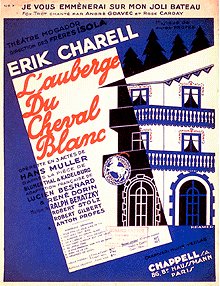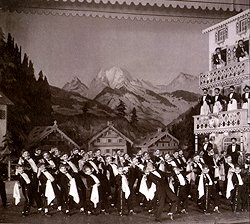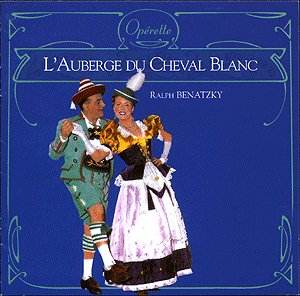This
CD set is one of the re-releases in the Accord series of twenty
operettas. In a version by Maurice Lehmann this recording was
the result of a revival held at the Théâtre du Châtelet,
Paris in 1953.
L’Auberge
du Cheval Blanc (The White Horse Inn) started life
as Im weissen Rössl and originally played to Berlin
audiences in 1930 for a respectable 416 performances. From Benatzky’s
German original the work was adapted for both the French and British
stage. The Paris première was held at the Théâtre
Mogador in 1932. The most famous number for English-speaking audiences
was 'Goodbye', but this was not in the original score and
was added by Stolz for the London production. Some of the numbers
in the British Chappell vocal score were altered from the German/French
versions, incidentally.
Ralph
Benatzky is not well known to us today. He came from Moravia
(Czechoslovakia) and conducted at a Munich theatre in 1910. He
went on to write songs and music for cabaret (in Vienna) and a
new genre ‘revue-operetta’ of which White Horse Inn is
the best remembered. His forte was in making arrangements. Casanova,
an earlier Benatzky work was well received by the public and paved
the way for The White Horse Inn. Benatzky did not write
all of its musical numbers. Lubbock's Complete Book of Opera
tells us that additional numbers were added by Robert Gilbert,
Bruno Granichstaedten, Robert Stolz and Hans Frankowski.
An
extended prelude replaces the need for an overture. A narrated
introduction leads to a brief vocal section and then a long opening
dialogue that tends to mask orchestral material and dampen the
proceedings from the start. The British [Samuel French/Chappell]
edition brought forward the first chorus number to provide an
opening scene and prelude to Act 1 which I find works much better.
The yodelling passage in this version follows the German version.
Both here and in the EMI French recording there is much strident
pseudo-Tyrolian yodelling that severely interrupts a developing
mood of romanticism. The French arrangement may work well on stage,
but since the yodelling is harsh the British version (unrecorded)
is probably superior. The rest of the operetta is much the same
in all versions.
In
this production there are two equally strong tenor/soprano pairs
of singers who could easily swap their parts; they are as strong:
Luc Barney and Colette Riedinger are certainly appropriate in
their pivotal roles as Léopold and Josépha yet Bernard
Plantey as Guy Flores and Huguette Boulangeot as Sylvabelle are
equally admirable as Guy and Sylvabelle.
In
this operetta/musical much of the score is devoted to duets and
one is conscious that the right voices are provided to give an
agreeable blend of harmony. The duets, 'La bonne Auberge de
Cheval Blanc' and 'Tout bleu' [CD1 tk.8 and 10] certainly
confirm the success of the above pairings, though in tk.10 Plantey's
voice seems to change to an even softer, richer tone. It must
be due to a difference in miking.
At
times the pace of some of the dialogue (French) is particularly
rapid and there is too much of it. One track at over 6 minutes,
another of over 7 minutes and another of 10 minutes makes me wonder
about any success with wide international sales. The White
Horse Inn has a short score and so the amount of dialogue
provided was probably included to fill four LP sides for which
it was originally mastered. Surely it would have been far better
to condense to fill one CD and edit down the dialogue to suit
as has been done with Accord's Les Saltimbanques in this
series? Again, one can expect dialogue to be spoken over incidental
(dance) music, but not where additional voice-overs have been
put over singing to help continuity. In one track dialogue masks
a piece by the chorus. A disappointing decision.
I
notice the sound engineer has changed his sound-stage during the
recording sessions. We get a mixture of well-balanced tracks and
others where the singers are very forwardly placed with the consequence
of masking orchestral detail. The recording transfer is good.
Brief
notes in French are provided in the attractive card case.
Raymond
Walker
Operette
series from Universal Accord reviewed
by Ray Walker


